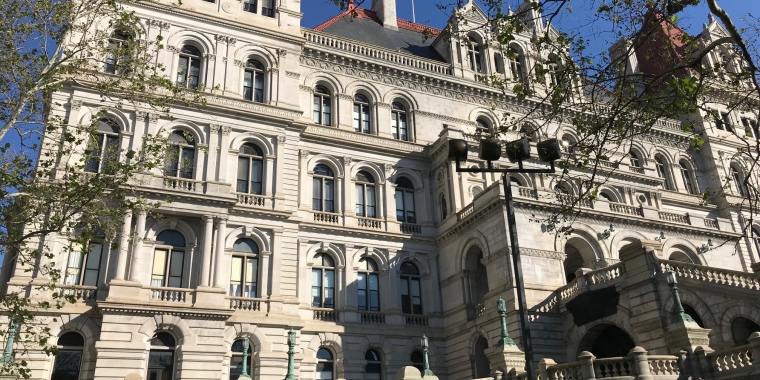
Senate Approves Energy Plan
The New York State Senate has approved a comprehensive energy plan that would provide motorists with immediate relief from high gasoline prices, Senator James L. Seward said today. The plan would ease the impact of skyrocketing home heating costs on senior citizens this winter and address the state's long term energy needs by encouraging the use of alternative energy and conservation.
The centerpiece of the senate's plan is a cap on state and local sales taxes on gasoline that would save consumers about $90 million through the rest of this year, and $400 million annually if gas prices remain near $3 per gallon and all localities participate. The senate's proposal includes using the windfall in state sales tax collections to provide rebate checks to senior citizens to help offset winter heating costs.
"The rising cost of gasoline and home heating fuels is hurting families, businesses and local governments," Seward said. "I voted to help lower gas prices and deal with the looming crisis of high heating fuel costs. Just as important, the senate would enact long term measures to encourage the use of alternative sources of energy and to encourage conservation."
In addition to the cap on gas taxes and the senior heating assistance program, the senate energy plan approved Tuesday includes bills that would:
> Provide a tax credit for the production of bio-fuel products;
> Extend tax credits for the purchase of alternative fuel vehicles;
> Extend property tax exemptions for alternative energy facilities;and
> Provide a sales tax exemption on Energy Star products, home insulation and newly installed alternative energy systems.
The senate will also act on a resolution asking the federal government to increase funding for the low income Home Energy Assistance Program, based on anticipated higher costs for home heating fuel this winter.
DETAILS OF THE SENATE'S PLAN
SALES TAX CAP ON GASOLINE
The senate energy plan would cap the state and local sales tax on gasoline at a taxable value of $2 per gallon. The cap would save motorists an estimated $45 million through the rest of the year and $200 million annually in state sales taxes, if gas prices stay at about $3 per gallon. The cap covers the local sales tax on gas unless a local government votes to opt out of the cap. If all localities participate, the plan would generate another $200 million in savings. (S.5968, Senator Joseph Robach (R-C-I-WF, Rochester).
In addition, the senate okayed legislation (S.5969) to prohibit gas station owners from raising the price of gas more than once a day.
SENIOR HEAT
The senate's "Senior Heat" program would provide $200 rebate checks to eligible senior citizen homeowners to help offset the cost of home heating. Seniors approved for the enhanced STAR school property tax rebate program (at least 65 years old with an annual income of less than $64,650) would be eligible for the Senior Heat program.
The Senior Heat program legislation would also provide a $100 refundable State tax credit to eligible senior citizens who rent and pay for their heat.
The Senior Heat program would be primarily funded with revenues from the gas tax windfall, now projected at $42 million, but estimated to grow to $100 million or more by the end of the fiscal year. The program would provide an estimated $140 million in assistance to more than 640,000 senior homeowners and renters. (S.5965, Sen. Spano)
In addition to soaring gas prices, the price for natural gas and heating oil has risen dramatically since last winter. According to NYSERDA, the average fuel oil price rose from $1.76 per gallon one year ago to $2.72 per gallon last week -- a 55 percent increase. New York homeowners consume an average 800 gallons of fuel oil each winter. Utilities are already projecting record increases in natural gas costs.
ENCOURAGING BIO FUEL PRODUCTION
The senate approved legislation (S.5846A) that would provide manufacturers of qualified bio-fuel products, primarily ethanol and bio-diesel, with a refundable tax credit. The credit would be 15 cents a gallon, capped at $2.5 million per plant, per year for up to four years.
The federal government and industry experts estimate that drivers in New York State would see a minimum savings of eight cents a gallon at the pump if New York State could provide a substantial amount of the ethanol that will be required to be used by the new Federal Energy Act of 2005. It is estimated that the credit will save New York State taxpayers $600,000 in SFY 2006-07 and $10 million a year in SFY 2010-11. As more New York State produced bio-fuels are added to the mix of gasoline at the pump, consumers will see a further easing of gas prices.
ALTERNATIVE FUEL VEHICLES
The senate approved a bill (S.5763A), sponsored by Senator Carl Marcellino (R, Syosset), that would extend through the end of 2006, the recently expired alternative fueled vehicle tax credit. The credit would apply to actual alternative fuels such as methanol, ethanol and fully electric vehicles. The bill also reestablishes a state sales tax exemption for the purchase of refueling property equipment. The bill is estimated to provide $3 million a year in credits through SFY 2007-08.
ALTERNATIVE ENERGY PROPERTY TAX EXEMPTION
The senate voted to extend for four years a law that allows localities and school districts to provide a full or partial exemption for real property taxes on land that contains alternative energy generation systems such as wind and solar power and farm waste to energy systems. The law is scheduled to sunset on January 1, 2006. (S.5966, Sen. Flanagan)
ENERGY STAR EXEMPTION
The senate approved a measure to eliminate the state sales tax on insulation materials such as high efficiency windows, doors, weather-stripping, pipe sheathing and alternative energy systems in or attached to a building such as wind power or fuel cells. In addition, the bill would provide four sales tax free weeks (one per season) on a variety of energy star products, such as washers, dryers, refrigerators, dishwashers, furnaces and hot water heaters. These measures are estimated to save New York State taxpayers $40 million a year. (S.5970, Sen. Hannon)
FUEL CELL CREDIT
The senate has approved a chapter amendment (S.5967) to a law passed this year (S. 2994-B), sponsored by Senator George Winner, (R-C, Elmira), that creates a new fuel cell credit. The law provides tax credits for the purchase of commercial fuel cell generating equipment and encourages their use.
ALTERNATIVE ENERGY EQUIPMENT
Earlier this year, the senate passed legislation (S.785), sponsored by Senator Charles Fuschillo (R-C, Merrick), that would provide a tax credit for businesses that install alternative energy equipment such as wind, solar or fuel cells. This bill would save New York State businesses $15 million a year beginning in SFY 2006-07. The assembly did not act on this bill.
AIRCRAFT FUEL
Earlier this year, the senate passed legislation (S.5755) that provides enhanced exemptions for petroleum business taxes on qualifying aircraft flights. The aviation industry would save an estimated $7 million under the bill, but the state revenue impact is neutral.



